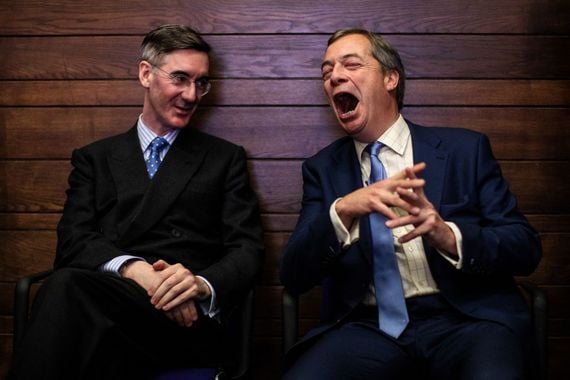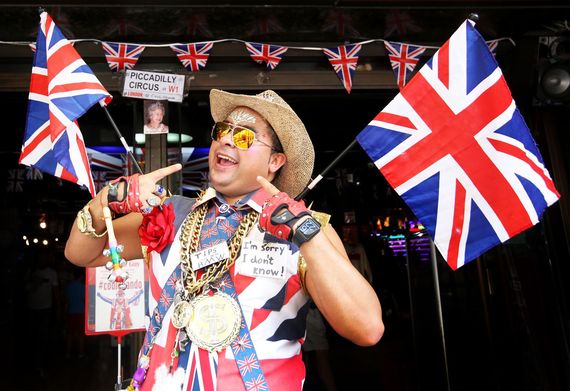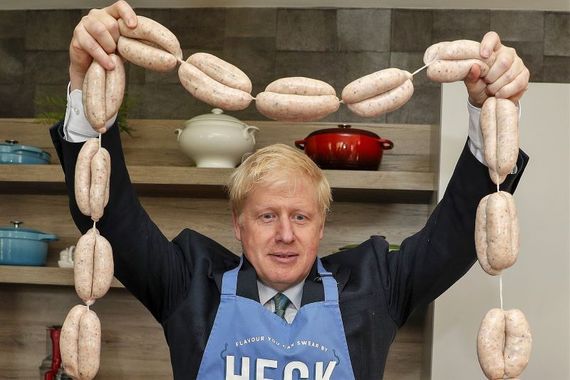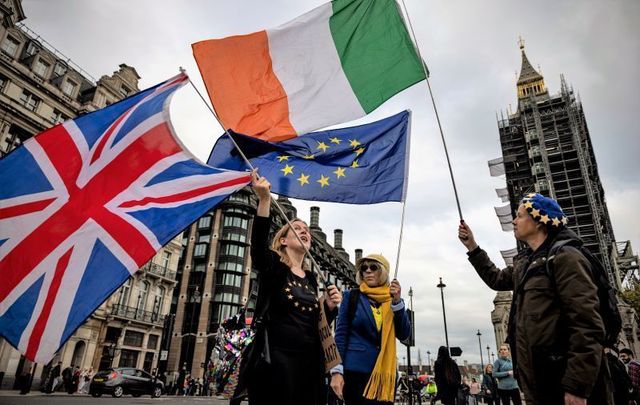If you tasked yourself with creating a political movement that harmed what it claimed to help, you couldn't do better than Brexit.
A Trojan horse enthusiastically wheeled into the UK by the same UK government who designed it, it must rank as perhaps the biggest own political goal in history.
One of the signature aspects of the Brexit debacle is that it has had the power to turn those who opposed it into its most prominent champions, as we have seen with bumptious UK Prime Minister Boris Johnson.
In this saga of workable solutions exchanged for intractable problems, Johnson's only consistent gambit has been to adhere to whatever momentary advantage he can find. These are my principles, he repeatedly tells us, and if you don't like them I have others, see.

Jacob Rees-Mogg and Nigel Farage, architects of Brexit. (Getty Images)
But like the ghost of old Banquo in Macbeth, the specter of Northern Ireland – a place that Johnson never visited or thought about before he became Prime Minister – keeps rising up to blight the best efforts of his increasingly nativist party to wave a fast farewell to the EU and England's long, troubled history in Ireland.
According to a series of tweets from Dominic Cummings, Johnson’s chief political adviser when he signed the Northern Ireland Protocol, Johnson never had any intention of honoring it. Cummings tweeted that he planned to have Johnson “ditch the bits we didn’t like” adding: “Of course there wasn’t good faith…cheating foreigners is a core part of the job.”
So that's the letter of the law for you and loopholes the size of the channel tunnel for me. Which really isn't the way to approach international law, but this is the least able crop of British politicians we have seen in generations and possibly ever.
Here in the US, people mostly see Brexit as a kind of national self-immolation.
Originally plotted in an era of intense anti-immigrant sentiment (with a chaser of nostalgia for a lost empire) it is fair to call Brexit an English nationalist revolt whose central aim was to finally send all the people they didn't like packing, which turned out to much of Europe, and the door the EU supposedly held open for foreign types.

We have seen how that is working out for them. Fuel crisis, driver shortages, worker shortages, haulage stoppages, gaps in the supermarket shelves, even McDonald's has temporarily stopped serving milkshakes. Clearly, it'll be a winter of discontent in the UK and there'll be cold comfort in knowing that they brought it on themselves.
But the sheer scale of the challenges facing the UK has started coming to light over the past months, where a lack of oil tanker drivers forced some petrol stations to close. Inevitably this led to many British drivers panic buying at the pumps, causing widespread shortages that persisted for days up and down the UK.
But even as the unwelcome realities that Brexit created stare them in the face, the backers of Brexit still cannot help themselves. The UK government has responded to the sudden truck driver shortage by offering 5000 foreign driver visas to EU drivers (and in a lovely Dickensian twist these visas run out on Christmas Eve, when it's expected the foreign drivers will drive themselves out of the UK).
“What we want to see is an emphasis on high wage, high skill - a high productivity approach to our economy. What I don't think that people in this country want to do is fix all our problems with uncontrolled immigration,” Johnson told the press. So he giveth visas, then he taketh them away. Talk about the spirit of Christmas. Ho ho ho.

July 4, 2019: Boris Johnson holds up a string of sausages around his neck during a visit to Heck Foods Ltd. headquarters, as part of his Conservative Party leadership campaign tour. (Getty Images)
The challenge with Brexit is to decide where it does the worst damage now. To longstanding diplomatic relations with the EU? To the UK's standing with the Biden administration? To Northern Ireland's hard-won peace process? Or to the UK's global standing as a trustworthy, law-abiding nation?
It's remarkable that Ireland, England's oldest colony and its original sin, keeps throwing a shiny spanner in the wrench of their bright EU exit plans. Ironies simply abound here. Recall that back in 2018, Johnson rejected then Prime Minister Theresa May’s backstop solution (that would have kept the UK aligned to the EU’s single market and customs union until an alternative was found).
Back then, Johnson resigned over the move, wailing that Britain was heading for “the status of a colony” over the odious deal. How dare Ireland reduce Britain to the kind of the place that they once reduced us. The ingratitude!




Comments